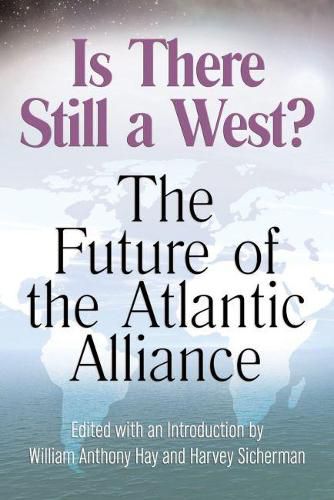Readings Newsletter
Become a Readings Member to make your shopping experience even easier.
Sign in or sign up for free!
You’re not far away from qualifying for FREE standard shipping within Australia
You’ve qualified for FREE standard shipping within Australia
The cart is loading…






The international response to the attacks of 9/11 promised a new sense of unity between the United States and its European allies, but subsequent disagreements over Iraq have made the Western alliance seem tentative at best.
Is There Still a West?
looks beyond recent events to put disagreements within NATO into historical perspective, exploring how cultural, demographic, economic, and military factors since the 1940s have affected future prospects for security cooperation. As questions underlying the current rift persist, distinguished scholars - Stephen Schuker, Michael Radu, Jeremy Black, and others - consider whether that gathering of nations long known as
the West
remains a valid construct. Claiming that differences over Iraq are no greater than past conflicts over Suez, China, or other issues, they adopt a
realist
stance in international relations to offer an alternative to neoconservative and liberal viewpoints. They show what the major issues - and nonissues - really are, and which among them are the true time bombs. These essays consider a range of relevant topics, from the impact of globalization to emerging differences in the political cultures of North Americans and Europeans to an analysis of head-scarf issues among Muslim immigrants. They particularly address the consequences of demographic shifts as Western countries try to deal with growing Muslim communities that present a security and cultural challenge. In proposing possible counterterrorism strategies to define a shared Western security policy, this book considers whether a distinctive Western way of war in fact exists and what it might mean for the alliance. These insightful essays look beyond transatlantic complaints to probe underlying difficulties, explore sources of conflict, assess prospects for economic divergence, and advocate a workable security policy. Together, they ask readers to consider whether
the West
is still a major force in international affairs or whether we face a new world of competing states and shifting alliances. By addressing these challenges,
Is There Still a West?
points toward the development of effective policies to ensure the ongoing unity of the West.
$9.00 standard shipping within Australia
FREE standard shipping within Australia for orders over $100.00
Express & International shipping calculated at checkout
The international response to the attacks of 9/11 promised a new sense of unity between the United States and its European allies, but subsequent disagreements over Iraq have made the Western alliance seem tentative at best.
Is There Still a West?
looks beyond recent events to put disagreements within NATO into historical perspective, exploring how cultural, demographic, economic, and military factors since the 1940s have affected future prospects for security cooperation. As questions underlying the current rift persist, distinguished scholars - Stephen Schuker, Michael Radu, Jeremy Black, and others - consider whether that gathering of nations long known as
the West
remains a valid construct. Claiming that differences over Iraq are no greater than past conflicts over Suez, China, or other issues, they adopt a
realist
stance in international relations to offer an alternative to neoconservative and liberal viewpoints. They show what the major issues - and nonissues - really are, and which among them are the true time bombs. These essays consider a range of relevant topics, from the impact of globalization to emerging differences in the political cultures of North Americans and Europeans to an analysis of head-scarf issues among Muslim immigrants. They particularly address the consequences of demographic shifts as Western countries try to deal with growing Muslim communities that present a security and cultural challenge. In proposing possible counterterrorism strategies to define a shared Western security policy, this book considers whether a distinctive Western way of war in fact exists and what it might mean for the alliance. These insightful essays look beyond transatlantic complaints to probe underlying difficulties, explore sources of conflict, assess prospects for economic divergence, and advocate a workable security policy. Together, they ask readers to consider whether
the West
is still a major force in international affairs or whether we face a new world of competing states and shifting alliances. By addressing these challenges,
Is There Still a West?
points toward the development of effective policies to ensure the ongoing unity of the West.